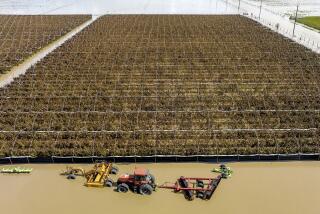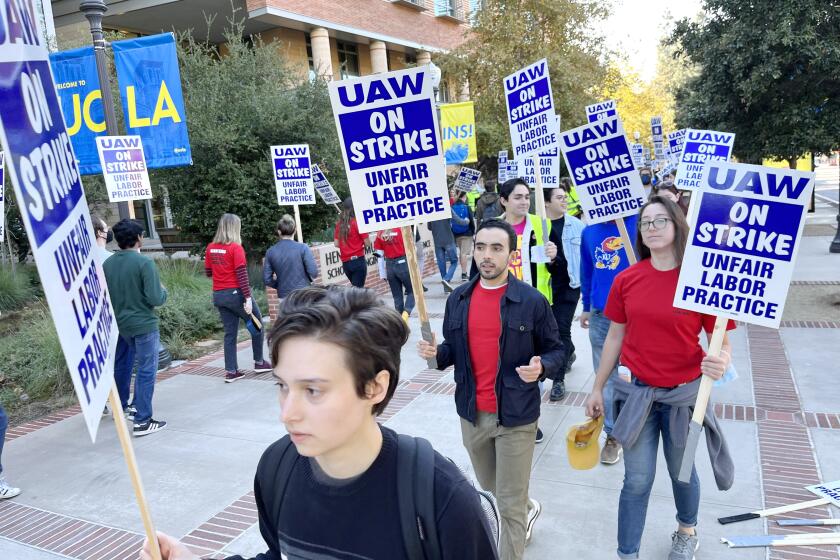Melon Ban Extended Through the Weekend : State Investigators Discover Two Kern County Fields Using Prohibited Pesticide on Crops
A statewide prohibition on the sale of watermelons was extended through the holiday weekend Friday after health inspectors discovered that two Kern County melon fields were contaminated by a toxic pesticide thought to have caused illnesses across California.
Lori Johnston, assistant director of the state Department of Food and Agriculture, said inspectors also found the pesticide aldicarb in samples taken from melons eaten by ailing Kern County residents. The pesticide is banned for use in watermelon fields, officials said.
As the number of illnesses apparently caused by the fruit rose to 30 in California, health officials fanned out across the state to sample melons in fields, produce distribution centers and grocery store storage areas. Three state laboratories were processing samples around the clock.
A ban on the sale and consumption of watermelons also remained in effect in Oregon and southern Washington, where 15 to 18 people suddenly became ill after eating melons earlier this week.
In all three states, health officials urged people who purchased watermelons before the recall to refrain from eating them. But they also noted that the apparent pesticide poisoning--which causes symptoms of nausea, vomiting and dizziness--has no lasting effects and is generally not life-threatening.
In Kern County and other agricultural areas, watermelon growers held onto hopes that the contamination would be isolated quickly, thus freeing clean fruit for sale and limiting damage to the state’s $25-million-a-year water melon crop.
But some areas already were feeling the economic pinch. Bill Snodgrass, Kern County’s deputy agricultural commissioner, said 2,000 tons of watermelons were ripening each day in county fields and stood a chance of rotting there.
“The cost is going to be in the multimillions,” Snodgrass said.
California’s emergency prohibition on selling and transporting watermelons was imposed Thursday--the beginning of what growers say is their biggest week of the year--when 18 people became ill after eating melons. The move followed by a day the ban in Oregon and southern Washington.
At a Sacramento press conference Friday, state Health Director Kenneth W. Kizer said one of the two tainted Kern County fields contained 160 acres of watermelons. The size of the second grower’s field was not immediately known.
At each site, inspectors found evidence that aldicarb sulfoxide, a substance caused by the breakdown of the pesticide aldicarb, was present in the soil or the melons. State officials declined to release the names of the growers.
It was not known whether the watermelons taken from ailing Kern County residents were grown in those fields, officials said. However, they added that the melons did also contain aldicarb.
Other Counties in Probe
“We are confident that the contaminated watermelons are coming from at least those sites,” Kizer said. “But at this time, we are not able to say with certainty that these are the only places they are coming from.”
Kizer and Rex Magee, associate director of the Food and Agriculture Department, said they hoped that laboratory analysis can be completed over the weekend, allowing the ban to be lifted or narrowed.
Besides investigating scores of fields in Kern County, state and local officials are cooperating in a probe of pesticide use in watermelon fields in Riverside, Kings, Fresno, Madera and Stanislaus counties.
Also cooperating in the probe were officials from Union Carbide, which sells aldicarb under the brand name Temik.
Speaking from their offices near Raleigh, N.C., Union Carbide officials said they were outraged at the improper use of the pesticide.
“We are utterly appalled,” said Mary Ann Ford, the firm’s public affairs manager. “This is just a gross misapplication.”
The pesticide, produced in a granular form that is applied to the soil, is barred for use on watermelons because they accumulate toxic residue through their roots, Union Carbide officials said.
Approved for Some Crops
Temik is approved for use on several crops--potatoes, grain sorghum, peanuts, cotton, sugar cane, sugar beets, sweet potatoes, dried beans, soy beans, pecans, citrus fruits and commercially grown flowers.
Those crops are specified on packages of Temik sold to those licensed to apply pesticides, Ford said. Also on the label is a warning in bold black letters: “Do not use on any crop not listed on this label. Any residues may be illegal or harmful.”
Dr. Peter Kurtz, medical coordinator for the Food and Agriculture Department, said the toxic substance, when ingested, interferes with an enzyme that regulates impulses from the brain’s nerve endings. When the enzyme’s effectiveness is curtailed, the result is an over-stimulation of the nerves, particularly those controlling the gastrointestinal system, Kurtz said.
But unlike the deadly listeriosis virus--present in Mexican-style cheeses recalled by the state three weeks ago--the illness is not usually fatal, he said.
“Symptoms should occur within minutes to an hour; there’s usually an immediate reaction,” he said.
“And they’re likely to be gone within 12 to 24 hours. They’re short-lived. And there are no residual, no chronic, long-term effects.”
Officials Flooded With Calls
Health officials said they were flooded with calls Friday from people suspecting that they had been affected by pesticide poisoning. The officials said they were mounting a widespread effort to alert retail stores to pull watermelons from their shelves.
In Los Angeles County, the Department of Health Services brought in all available workers to call more than 10,000 retail outlets and grocery chains who might still have melons in their produce bins.
“They’ve just mobilized anybody they can get a hold of,” said department spokeswoman Toby Milligan.
On Friday, the county workers contacted 5,415 markets and found that 582 said they still had watermelons on sale, Milligan said. Health Services representatives visited 407 markets that were chosen on a random basis and found 51 still selling the product. All outlets still marketing the melons were told to remove the product, Milligan said.
The spokeswoman said the department will finish its phone survey of the remaining markets today. Inspectors will also return today to the stores that were out of compliance on Friday and make further random checks on markets, Milligan said.
Phones Ring Constantly
In Kern County, phones rang constantly, especially after the announcement that aldicarb was found in samples of Kern-grown melons. Fifteen county biologists were sent into the fields to augment the efforts of state officials, and others maintained a constant shuttle to Fresno, where laboratories tested the samples.
The contamination “couldn’t have come at a worse time”, said Snodgrass, the county deputy agricultural commissioner. Even if the prohibition were lifted soon, he said, there is still some fear that the negative economic impact would continue. Kern County officials were considering some sort of flagging effort--such as tags plastered on clean melons--to encourage people to purchase melons after the prohibition is relaxed.
“It all depends what the consumer confidence level is going to be,” he said.
More to Read
Start your day right
Sign up for Essential California for news, features and recommendations from the L.A. Times and beyond in your inbox six days a week.
You may occasionally receive promotional content from the Los Angeles Times.







